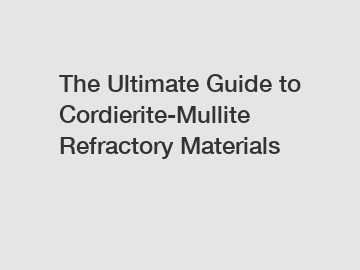The Ultimate Guide to Cordierite-Mullite Refractory Materials
The Ultimate Guide to Cordierite-Mullite Refractory Materials.
Refractory materials are essential in the construction industry, especially in high-temperature applications such as furnaces, kilns, and incinerators. One such refractory material that has gained popularity in recent years is cordierite-mullite. In this article, we will explore everything you need to know about cordierite-mullite refractory materials, from their composition and properties to their applications and benefits.
Understanding Cordierite-Mullite Refractory Materials.

Cordierite-mullite refractory materials are a blend of two mineral compounds: cordierite and mullite. Cordierite is a magnesium aluminum silicate mineral with a low thermal expansion coefficient, excellent thermal shock resistance, and good strength at high temperatures. Mullite, on the other hand, is an aluminosilicate mineral known for its high refractoriness, low thermal expansion, and excellent thermal shock resistance.
Composition and Properties.
Cordierite-mullite refractory materials are typically composed of approximately 40-60% cordierite and 40-60% mullite. This combination results in a material that possesses excellent thermal shock resistance, low thermal expansion, high refractoriness, and good strength at high temperatures. Additionally, cordierite-mullite refractories have good chemical stability, making them resistant to degradation when exposed to corrosive environments.
Applications.
Due to their exceptional properties, cordierite-mullite refractory materials find applications in a wide range of industries. One primary application is in the production of ceramics, where cordierite-mullite refractories are used as kiln furniture, saggers, and crucibles. They are also widely employed in the steel industry for the lining of reheating furnaces, hot blast stoves, and ladles. Furthermore, cordierite-mullite refractories are utilized in the cement industry, foundries, and incinerators due to their ability to withstand extreme temperatures and thermal shock.
Benefits of Cordierite-Mullite Refractory Materials.
1. Thermal Shock Resistance: Cordierite-mullite refractories can withstand rapid temperature changes without cracking or breaking, making them ideal for applications where thermal shock is a concern.
2. Low Thermal Expansion: The low thermal expansion coefficient of cordierite-mullite refractories prevents them from expanding or contracting excessively under varying temperature conditions, reducing the risk of thermal stress.
3. High Refractoriness: With a melting point of around 1500°C, cordierite-mullite refractory materials can withstand high temperatures without losing their structural integrity.
4. Chemical Stability: Cordierite-mullite refractories are chemically stable, meaning they can resist chemical attack from various substances, including acids and alkalis.
Closing Paragraph.
In conclusion, cordierite-mullite refractory materials offer a combination of excellent thermal shock resistance, low thermal expansion, and high refractoriness, making them suitable for a wide range of high-temperature applications. Their chemical stability further enhances their durability in corrosive environments. If you require reliable and high-quality cordierite-mullite refractory materials for your industrial needs, do not hesitate to contact us.
Keywords: contact us.
The company is the world’s best high alumina bricks, refractory mortar, castable refractory cement supplier. We are your one-stop shop for all needs. Our staff are highly-specialized and will help you find the product you need.


